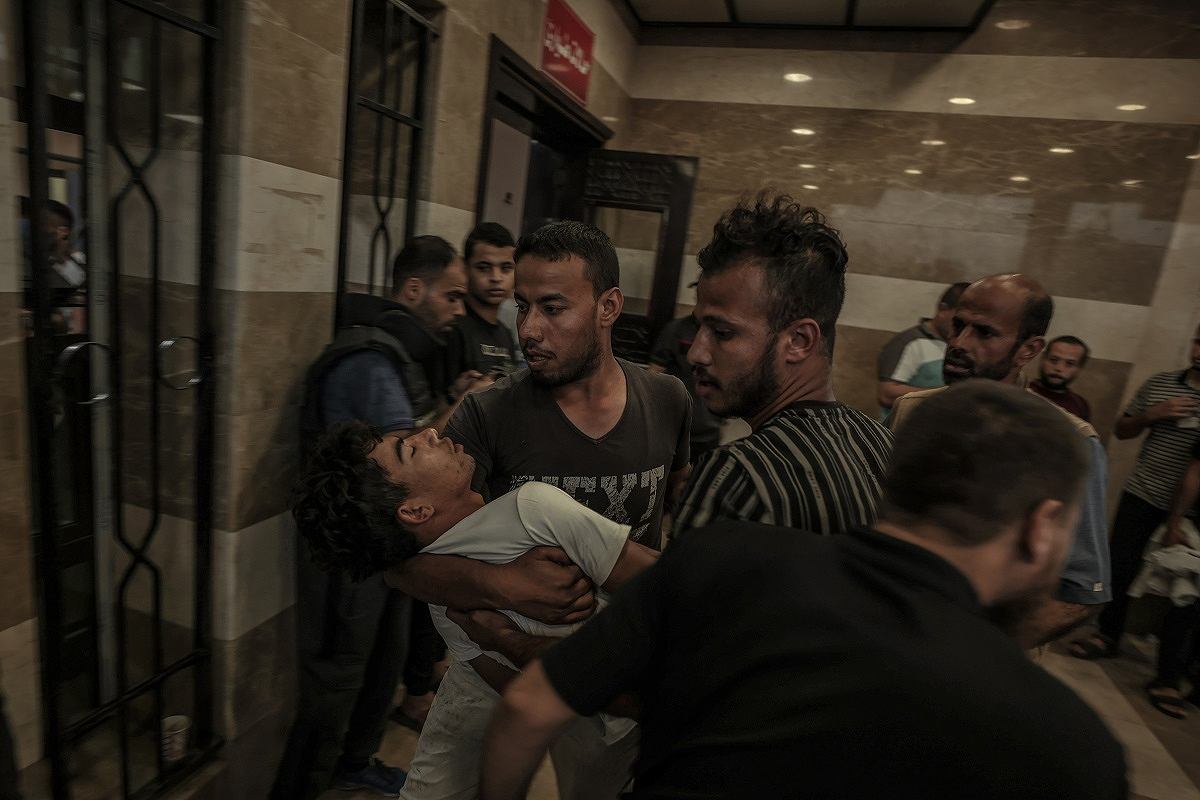
An injured man is brought to the Nasser Medical Hospital in Khan Younis in southern Gaza on Thursday.
13:43 JST, October 27, 2023
NUSEIRAT CAMP, Gaza Strip – Khaled Ashqar could no longer outrun death. A week into the war, he quickly packed a few necessities and took his family south from Gaza City.
This is what Israel’s military had told Gazans: head to the southern part of the enclave for their own safety. Ashqar also had been through past wars and knew Gaza City could be hit hard.
But the bombardments continued along his route. Ashqar moved again. Nowhere felt safe, the father of four said. A journalist, Ashqar spent hours reporting on the rising death toll. On Saturday, he received word of a strike near the four-story building where his family was staying in the Nuseirat refugee camp in central Gaza.
The blast punched through the front of the building. His wife was struck in the head by shrapnel, said Ashqar, who asked that his media outlet not be identified to protect his family’s privacy. She was dead before reaching the hospital.
The death was “not something special,” Ashqar told The Washington Post by phone. “It’s something that’s happened to all Gazan people here,” he said, “to all Gazan families.”
As Gaza’s deadliest war grinds on, the search for safety feels increasingly futile for many Palestinians, who also face dwindling reserves of water, food and fuel, with just a trickle of humanitarian aid reaching Gaza. In recent days, Israel said it was intensifying its attacks on Hamas “military targets across the Gaza Strip” ahead of an expected ground offensive.
A ground war is likely to further reduce the places to hide. Palestinian civilians such as Ashqar are abandoning hope of finding any haven to ride out the war. “There is nowhere safe in Gaza,” he said.
That now includes areas that Israel once said would be spared the brunt of its attacks. On Oct. 13, the Israel Defense Forces dropped leaflets on Gaza and sent text messages in Arabic ordering the more than 1 million residents of northern Gaza and Gaza City to evacuate “for your own safety.” Israeli Defense Minister Yoav Gallant told reporters at the time: “Those that want to save their life, please go south.”
Some Gazans heeded the warning while others stayed put amid outcry from international rights groups over Israel’s demands. This week, almost two-thirds of the casualties from Israeli strikes occurred in the southern part of the enclave, the Gaza Health Ministry said Wednesday. The figures could not be independently verified by The Post. In attempts to counter questions about the body count in Gaza, the Gaza Health Ministry released a document Thursday that it said contains names and other details of those killed.
The Israeli military did not respond to a request for comment regarding civilians killed in central and southern Gaza. The Gaza Health Ministry says more than 7,000 Palestinians have been killed since the war began Oct. 7, following the deadly raid into Israel by Hamas militants who killed more than 1,400 people and took more than 200 hostages.
In Rafah, near the crossing to Egypt that has been the only route for a limited flow of relief convoys, a doctor at Abu Youssef El-Najjar Hospital told The Post on Thursday that the dead and the living share the same spaces. “Those killed are left on the ground inside the hospital,” said the doctor, who spoke on the condition of anonymity out of fear for his safety.
El-Najjar, with only 55 beds, has been receiving about 150 bodies on average per day, he said. On Wednesday, the hospital tallied 102 dead and 195 injured.
One woman in Deir el-Balah in central Gaza, said she has trained her ear to follow ambulances from the nearby hospital. After a bombardment, she calls who she can reach to exchange information and check who is alive, who is not and who is missing. She spoke on the condition of anonymity to protect her security. In Rafah, Bassam Naser, an aid worker, told The Post that he “hears bombardments 24/7.” He has kept enough coveted fuel in his car for one trip: either to head back north, or to go to the hospital.
On Wednesday, an Israeli strike killed at least eight people and destroyed the only remaining bakery in Maghazi refugee camp in central Gaza, according to Gaza’s government press office. The Israeli military did not respond to a request for comment.
Authorities in Gaza said that the U.N. Relief and Works Agency for Palestinian refugees donated flour to the bakery on Tuesday to help subsidize the cost of bread as Gazans struggle to find and afford basic necessities.
Farther south in the city of Khan Younis, at least nine members of the El-Fara family were killed in a strike on Wednesday, two days after at least 16 other relatives died in another nearby attack, according to Musheir El-Farra, a human rights activist in Gaza.
“They had no affiliation at all to Hamas. They are Fatah people,” El-Farra told The Post by phone, referring to Hamas’s rival party that dominates in the West Bank.
“This area had never been bombed before” during previous wars, El-Farra said, claiming that Israel is waging “collective punishment” with “indiscriminate” attacks on residential areas in Gaza.
That evening, Al Jazeera Arabic viewers watched in real time as its Gaza bureau chief, Wael al-Dahdouh, grieved for his wife, two children and grandson killed in the Nuseirat refugee camp, where the family moved after Israel’s order to leave the north.
Early in the war, Ashqar also fled his home in Gaza City’s Tel al-Hawa neighborhood for his sister’s house. He thought, based on past wars, that she was in a relatively safe part of Gaza City. It wasn’t. Days later, he took his family south. He and his wife and children tried living in Khan Younis in an apartment built by Qatar after Israel’s 2014 war in Gaza. They fled three days later, after an Israeli strike hit next door, Ashqar said.
Their third move became his wife’s last. Ashqar next went to a building owned by his family in the Nuseirat refugee camp. Twelve families crammed into the building.
On Saturday, his wife, who was a Dutch citizen, ventured to the nearby Nuseirat camp market, which was hit with an airstrike earlier in the war. She bought milk, eggs and vegetables – all luxuries in wartime Gaza. That evening, around 7:30 p.m., the earth suddenly shook, Ashqar said, and his wife, along with at least five others, were killed. His son, niece, and brother’s wife also were among the dozens wounded.
The milk, eggs and vegetables his wife had just bought survived, said Ashqar. He later found them in the kitchen covered in dust and ashes.
Top Articles in News Services
-

Survey Shows False Election Info Perceived as True
-

Hong Kong Ex-Publisher Jimmy Lai’s Sentence Raises International Outcry as China Defends It
-

Japan’s Nikkei Stock Average Touches 58,000 as Yen, Jgbs Rally on Election Fallout (UPDATE 1)
-

Japan’s Nikkei Stock Average Falls as US-Iran Tensions Unsettle Investors (UPDATE 1)
-

Japan’s Nikkei Stock Average Rises on Tech Rally and Takaichi’s Spending Hopes (UPDATE 1)
JN ACCESS RANKING
-

Producer Behind Pop Group XG Arrested for Cocaine Possession
-

Japan PM Takaichi’s Cabinet Resigns en Masse
-

Man Infected with Measles Reportedly Dined at Restaurant in Tokyo Station
-

Israeli Ambassador to Japan Speaks about Japan’s Role in the Reconstruction of Gaza
-

Videos Plagiarized, Reposted with False Subtitles Claiming ‘Ryukyu Belongs to China’; Anti-China False Information Also Posted in Japan



























